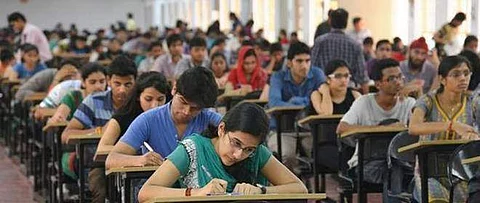

The union government is expected to introduce a fresh bill in Parliament on Monday, February 5, to address the issue of malpractices and irregularities in competitive examinations, proposing a maximum jail term of 10 years and a fine of up to Rs 1 crore, stated a report in The New Indian Express.
While the Public Examination (Prevention of Unfair Means) Bill, 2024 is a much-awaited bill, experts in the educational sector said that stakeholder engagement is key for effective implementation at all levels to punish the ‘paper leak’ mafias.
According to news reports, the union cabinet cleared the bill in a meeting before the Interim Budget.
While the government aims to prevent malpractices experts fear that the bill might hamper the children’s future.
Subba Reddy NV, Pro-Vice-Chancellor, CMR University, said the government should ensure that the fine and jail penalty target only those involved in organised cheating schemes, not individual students —jeopardising their future. “Guidelines should include clear distinctions between intentional cheating and unintentional mistakes. Penalties should prioritise rehabilitation and education rather than severe punishment for young offenders,” she added.
Another professor in the city said that the ambitious bill will need a close collaboration between the Ministry of Education and all the state education departments.
“What is extremely important is the strict implementation of law in practice. It is not the magnitude of the punishment alone that matters but also the swiftness and the certainty of punishment. The implementation of the law should be such that it should deter anyone from resorting to such malpractices,” said YSR Murthy, Vice-Chancellor, RV University.
Currently, in India, there are around 300 entrance exams in various disciplines that an undergraduate can opt to appear and about 50 are conducted by the government for public service jobs. Educationists asserted that while an unfair means bill might be the need of the hour the government also needs to look at revisiting the testing system on a timely basis to address the challenges.
Rajendra K Sinha, Professor, Jagdish Sheth School of Management, said, “This would require strengthening of IT and physical infrastructure. Developing foolproof IT security systems, and ensuring electronic surveillance. And it is important to provide adequate security for invigilators in the centres from the powerful mafias.”
When it comes to the implementation, educationists worry that students might have to bear the cost of these compliances, increasing exam fees. “It is t important to exercise caution to avoid placing an excessive burden on students by increasing the cost of examinations,” said Piyush Kumar Pareek, Professor, Nitte Meenakshi Institute of Technology (NMIT).
